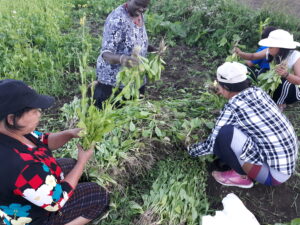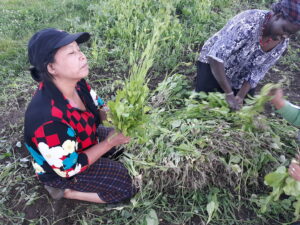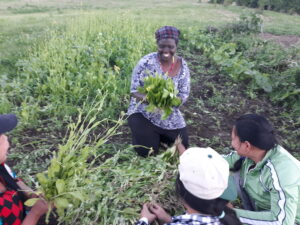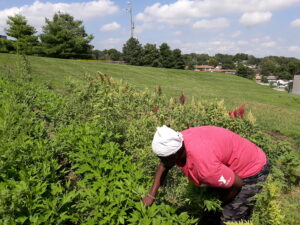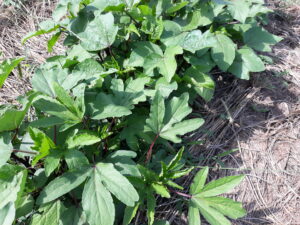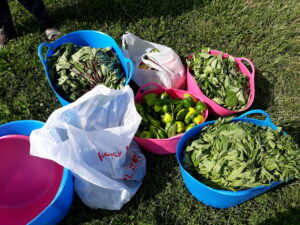Final report for FNC18-1151
Project Information
Omaha Home for Boys operates Cooper Farm, which is a 100 acre farm within the city limits of Omaha which features vegetable crops, a high tunnel, laying hens, beef cattle, and seasonal sheep production. In addition, about 2 acres is used on the Omaha Home for Boys main campus for production. The New American Urban Farmer Program has been given about one acre of production space on the main campus with the possibility of adding additional space into production. Previous sustainable practices included cover crops, high tunnel, and organic practices that have been added to the farm within the past three years. In 2020, the program was relocated to the OHB Cooper Farm location, which provides expanded access to tools, storage, produce cold storage, and a high tunnel on property.
The New American Urban Farmer Program is a program to train refugees and new immigrants in agriculture and farm business best practices. The targeted participants are a part of the 6,038 refugee community living in Omaha, NE since 2011 in one of the largest food deserts in the city. Many of them struggle with barriers to housing, transportation, language, employment, and lack of a social network. The purpose of this initiative is to identify and measure indicators to teach best practices using sustainable farming methods to improve participant production and farm business skills and knowledge with the intent of New Americans learning to grow and increase culturally relevant healthy food choices for their family and community at-large and establishing roots in their new community. An impact analysis of this project will explore new social networks for refugees and potential effects on connecting with their new home community.
Throughout this project, circumstances has made achieving all of the planned education goals difficult - from excessive rain, to personal circumstances, to a global pandemic - it has been difficult to develop this program as envisioned. However, thanks to the development of partnerships with other groups working in the same area of refugee land access and education, producing food for at-risk communities, and entrepreneurship during the pandemic we were able to provide impacts beyond the goals of the project that will improve production and capacity in the target community for years beyond.
In 2020, the Refugee Women of Nebraska had lower participation levels due to the pandemic, but were able to still grow around 200 pounds of produce with five participating growers. The participants sold produce at a local community market, earing roughly $100 and learning how to sell produce to customers at a farmers market. Additionally, farm production space was made available to three local non-profit organizations working in urban agriculture: City Sprouts (focused on community gardens, youth production internships, and growing produce for low-resource communities), Whispering Roots (focused on growing produce for low-resource communities), and Lutheran Family Service's Global Roots program (farm education for immigrants and refugees, and providing production plots for refugee families). As a result, in 2020 over 11,000 lbs of produce were grown at Omaha Home For Boys Cooper Farm, all of which went to food pantries or "pay what you can" markets in at-risk neighborhoods, 24 refugee families had access to small individual production spaces, 5 interns received production training throughout the season, and over 20 volunteers were involved in production and sharing of best practices.
The project was extended to August 2021 to allow for objectives to be met and funds to be spent due to COVID-19. Unfortunately, virus levels still made the project difficult to fully implement in 2021 for the Refugee Women of Nebraska. Six members of the refugee community participated in the communal growing plot maintained by RWON at Cooper Farm. Thanks to the work of interns through the AmeriCorps VISTA Summer Associate program assisting partners working at the farm, the small group was able to increase production and the produce washing station was built and utilized. While the RWON participants did not sell produce at a farmers market, participants grew at least 220 lbs of black eyed peas, 100 lbs of "sour leaf" hibiscus, 100 lbs of tomatoes, 90 lbs of specialty peppers, 75 lbs of okra, 75 lbs of mulikia (jute leaf), and 50 lbs of Akayo (African bitter leaf). Participants sold at least $150 worth of culturally appropriate produce directly to community members, produce was donated to a local homeless shelter serving refugees, and shared crops amongst themselves and their families, providing access to culturally important foods. The partnerships started in 2020 continued in 2021, expanding the impact of the project beyond Refugee Women of Nebraska. At least 24 refugee families grew produce on the farm in individual plots through Lutheran Family Service's Global Roots program and City Sprouts worked with 5 interns and additional volunteers to grow several tons of produce for local low-income neighborhood markets.
- Train new Americans on best practices in sustainable urban farming.
- Reduce New Americans isolation and loneliness by helping to build connections to new homeland.
- Increase access to nutritious and healthy foods in low-income and at-risk populations.
- Investigate soil quality improvements with the New American’s native agricultural practices.
Cooperators
- (Educator)
Research
No research has been conducted as part of this project.
n/a
Educational & Outreach Activities
Participation Summary:
The program was shared with refugee communities across Omaha through the efforts of Christine Ross of Refugee Women of Nebraska through engagement with churches serving the refugee communities. Ten participants participated in the planting and management of harvest through the season, representing a diverse groups of refugees in the community. On-farm workshops were led by Refugee Women of Nebraska leader, Christine Ross, with assistance from John Porter of Nebraska Extension. During the harvest period, six more participants from the refugee community joined the program to assist with harvest and management. Additionally, four visitors from refugee communities in other cities (Garden City, Kansas and Nashville, TN) came to the farm to observe how work was being done and to participate in work days. Efforts toward education and work on the farm were subdued in 2019 due to the early spring rains and floods and several family emergencies taking Christine Ross out of town for long periods of time. Due to these difficulties, which resulted in low productivity, the program did not focus on selling produce in local markets but plans to do so in 2020.
Demonstration and work days
2020 update: Unfortunately, due to the COVID-19 global pandemic, no educational programs were possible in 2020. However, 5 participants from the previous year did continue growing produce at the farm and did take their produce to the farmers market to sell. There were five total participants who raised about 200 lbs of produce. Tomatoes grown by the participants were sold at the farmers market, raising around $100 and providing hands-on experience for selling produce at a farmers market.
2021 update: No formal education opportunities were planned due to COVID-19. However, 6 participants from the refugee community participated in communal growing at the farm.
Learning Outcomes
This grant has provided opportunities to educate local refugees and immigrants on farming practices and allow them production space at our facilities. From the participants in the program we learned:
- Having a leader in the community is crucial.
- Ensure that there are multiple ways of communication to participants in case the central leader from the community is unavailable - when Christine was away for emergency reasons, little work was done on the farm.
- Common crops consumed by the immigrants in their home countries are not available locally for purchase, and instead they are often faced with produce they do not know how to prepare or develop unhealthy diets.
- There are local marketing opportunities for ethnic specialty crops through local ethnic grocery stores and farmers markets.
- Cross-cultural sharing results in a vibrant and diverse farm, with participants from different cultures sharing how their crops are similar and different. Participants sharing their own seeds and plants add variety to production and ensure availability of culturally important foods.
- Involving new partners (Lutheran Family Services) can help with increasing educational capacity and access to language-specific resources and translators.
The participants learned:
- Techniques for efficient production of crops, including trellising, mulching, and irrigation as opposed to previous, less-efficient means of production.
- Cross-cultural sharing of crops and food culture.
- Marketing opportunities for ethnic specialty crops, including the participation of local ethnic grocery store owners in the planning process.
- Leadership to provide internal direction for farming project.
- Sharing of crops among participants builds a community.
Project Outcomes
2020 update: Direct program implementation was impossible during the pandemic in 2020. However, relationships developed with City Sprouts, Whispering Roots, and Lutheran Family Services Global Roots program allowed the expanded use of the farm to further develop impacts beyond the original goals. John Porter of Nebraska Extension assisted in developing and fostering these relationships. As a result of this collaboration, over 11,000 pounds of produce were grown by the organizations to be distributed to at-risk communities through food pantries and "pay-what-you-can" farmers markets and 24 refugee families had access to individual growing plots. In addition, community partner City Sprouts used the farm to train 5 high-school aged interns in farm production strategies and over 20 volunteers were involved in production and sharing best practices.
Individuals from the Acholi people of South Sudan were part of the participant group, and in their culture when there is a funeral, traditional food is very important. Last summer a member of the community died. At the funeral, culturally important vegetables from the project became the support for the traditional food required for the funeral, feeding more than 100 people. This demonstrates that foods serve a very important role for the participants from that culture and that providing opportunities for the community to grow culturally important foods is important.
Another important impact of the project was the therapeutic help for a mentally ill community member. One lady from South Sudan, suffers from a currently undiagnosed mental disability. Her disability has prevented her from working and being able to provide for herself. Christine, the leader of RWON, knew Grace (not her real name) and also knew that Grace use to tell her how she love to grow in the garden. Grace was happy to be invited to work in the garden and helped whenever Christine could bring her to the work days. At harvest, Grace was the happiest of all the participants- she knew she did not need to buy tomatoes and knew that she could have vegetables like those that she use to eat while in Africa. The whole of the summer Grace was very happy and would wait for Christine every day to go to the garden. Gardening not only allowed Grace to enjoy growing and eating vegetables, but provided much needed horticultural therapy and social connection, greatly assisting her mental health. The growing also connected Grace with members of the other communities - even without a shared language and little English she connected very well with some of the Asian participants, who helped with other needs and directing her to resources that they knew.
2021 update: Two Americorps VISTA summer associates working with UNL Extension were stationed at Cooper Farm to assist RWON and other partners growing produce at the farm. These associates assisted with organization, farm tasks, and building projects around the farm for 14 weeks throughout the summer. These associates developed relationships with the refugee participants working with RWON, learning about culturally significant crops and agricultural practices and sharing their own best practices. Thanks to their work, RWON producers were able to increase production and capacity at the farm was increased through the building of the produce washing station and organization of produce storage areas as well as shared tool and equipment organization.
RWON was able to increase production of culturally appropriate crops, which were shared among participants, sold to local community members, and donated to homeless shelters. In 2021, participants grew at least 220 lbs of black eyed peas, 100 lbs of “sour leaf” hibiscus, 100 lbs of tomatoes, 90 lbs of specialty peppers, 75 lbs of okra, 75 lbs of mulikia (jute leaf), and 50 lbs of Akayo (African bitter leaf). Participants sold at least $150 worth of culturally appropriate produce directly to community members, produce was donated to a local homeless shelter serving refugees, and shared crops amongst themselves and their families, providing access to culturally important foods.
